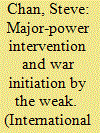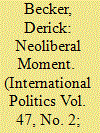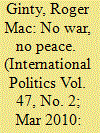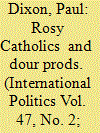|
|
|
Sort Order |
|
|
|
Items / Page
|
|
|
|
|
|
|
| Srl | Item |
| 1 |
ID:
098469


|
|
|
|
|
| Publication |
2010.
|
| Summary/Abstract |
Weak states often instigate war against the strong, sometimes repeatedly so. I explain this phenomenon by recourse to the nature of the contestants' foreign alignments. Pivotal patronage, balanced patronage, competitive patronage and one-sided patronage are offered as ideal types, and five rivalry cases are introduced to highlight the variations in the willingness and opportunity for war initiation by the weaker side and the intensity and duration of the subsequent conflict (should it occur). Whether the pertinent international system is unipolar, bipolar or multipolar distinguishes the alignment types, which in turn point to the concerns for relative gain and credible commitment that motivate the weaker side's decisions.
|
|
|
|
|
|
|
|
|
|
|
|
|
|
|
|
| 2 |
ID:
098473


|
|
|
|
|
| Publication |
2010.
|
| Summary/Abstract |
This article is motivated by two trends in international relations (IR): the general trend toward global neoliberalism, and the discursive turn in IR scholarship. Neoliberalism, while not fully practised anywhere, has become the dominant discourse and normative measure of economic policy ideas around which policy debates coalesce. This all is the more noticeable among the lesser-developed countries. This article attempts to explain this gradual shift in the global political economy where most discussions centre around a core set of ideas and beliefs about how the system ought to function. Given that evidence of this ideational/discursive shift predates the end of the Cold War and changed out of step with the steady growth in economic interdependence, new approaches are warranted. What is argued here is that the study of social interaction among states will shed considerable light onto how the international system has developed into its current state.
|
|
|
|
|
|
|
|
|
|
|
|
|
|
|
|
| 3 |
ID:
098468


|
|
|
|
|
| Publication |
2010.
|
| Summary/Abstract |
Many societies emerging from civil war can be described as experiencing 'no war, no peace' situations. Despite a ceasefire or peace accord, these societies may continue to be mired in insecurity, chronic poverty and the persistence of the factors that sparked and sustained the civil war. Yet the post-Cold War period has also witnessed massive peace-support interventions aimed at shoring up peace accords and post-peace accord states. This article identifies and conceptualises the 'liberal peace' as the formulaic western peacebuilding vehicle wheeled out in response to civil war and peace processes. It argues that the liberal peace is often inflexible, ethnocentric, ministers to conflict manifestations rather than causes, and is unable to address the underlying factors contributing to armed conflict in deeply divided societies. It is the structural factors behind the liberal peace that explain why so many peace processes fail to deliver peace.
|
|
|
|
|
|
|
|
|
|
|
|
|
|
|
|
| 4 |
ID:
098472


|
|
|
|
|
| Publication |
2010.
|
| Summary/Abstract |
This study attempts to understand the perceived contribution of the International Fund for Ireland and European Union Peace II Fund in reducing violence and sectarianism in Northern Ireland (NI). We employ cross tabulations and nonlinear binary response models using public opinion survey data as well as analysis of 98 interviews conducted during the summer of 2006. Overall, we find Unionists to be less optimistic than Nationalists about the contribution of international economic assistance in reducing violence in NI. The perception of respondents about the role of international economic assistance in peacebuilding varies across gender, political affiliation and the nature of the relationship between individual and the funding agencies. The interview data reveals both the constructive and destructive potential of economic aid in NI's peacebuilding and post-violence development processes.
|
|
|
|
|
|
|
|
|
|
|
|
|
|
|
|
| 5 |
ID:
098471


|
|
|
|
|
| Publication |
2010.
|
| Summary/Abstract |
This article challenges the orthodox, 'pan-nationalist' view of the impact of the Cold War and President Clinton's role in the Northern Ireland peace process. It is argued that this orthodox view places much faith in the 'front stage'; self-congratulatory accounts of political actors who sought to enhance their reputations through involvement in the peace process. A theatrical metaphor is deployed to 'go behind the scenes' and produce a more nuanced account of the influence of the US President. It is argued first, that the pan-nationalist charade deliberately exaggerated Clinton's role in order to demonstrate the power of 'unarmed struggle' and win over a key republican audience to the peace process. Second, the British government, to some extent, played its 'villainous' role in the pan-nationalist charade because it understood the Sinn Fein leadership's problems in bringing a united republican movement into a ceasefire. Third, the peace process was emerging well before the US President took his cue from Irish nationalist politicians to enter the political stage. Fourth, the 'pan-nationalist' view does not consider the malign impact of the US role on unionism, which underlined unionist isolation and undermined pro-Agreement unionism. Finally, it is argued that President Clinton's grasp of the 'realities' of Northern Irish politics was not firm and the President oscillated between an overoptimistic 'modernising' view of the conflict and over-pessimistic primordial - 'Rosy Catholics' and 'Dour Prods' - view neither of which accurately describes the conflict.
|
|
|
|
|
|
|
|
|
|
|
|
|
|
|
|
| 6 |
ID:
098470


|
|
|
|
|
| Publication |
2010.
|
| Summary/Abstract |
Non-compliance occurs in all international organizations and hampers the effectiveness of international law. Despite increasing international legalization, we know little about how international courts abolish non-compliance. Why do states sometimes abolish non-compliance before but sometimes only after judgements or even threats with penalties? This article argues, first, that there are few differences between weak and powerful states in reacting to the European Court of Justice. Second, contrary to the expectation of legalization approaches, judicial means, such as judicial discourses, cannot always facilitate compliance. Third, by contrast to the expectations of enforcement theories, powerful states do not resist judgements and sanction-threats to a greater extent than weak states. Fourth, non-country variables, such as the gravity of the infringement or the choice of judicial interpretational devices, are scope conditions for the success of judicial discourse and sanctions and are crucial in explaining how norm violations of weak and powerful states can be resolved by the international courts.
|
|
|
|
|
|
|
|
|
|
|
|
|
|
|
|
|
|
|
|
|